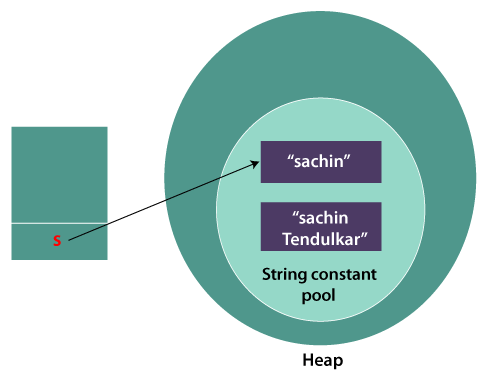Why Are Strings Immutable in Java? Protection and Performance Conveniences
Why Are Strings Immutable in Java? Protection and Performance Conveniences
Blog Article
What Is Unalterable Strings and Just How It Works
In the world of shows, comprehending the principle of unalterable strings is critical for developing robust and secure applications. Unalterable strings refer to strings that can not be changed after they are produced, ensuring data integrity and predictability within the code. This fundamental concept plays an essential function in various programming languages and offers a distinct approach to taking care of information. By discovering the intricacies of how immutable strings operate, one can discover a world of advantages and possibilities that can boost the high quality and efficiency of software program advancement.
The Essentials of Unalterable Strings
Immutable strings, as a fundamental principle in shows, are character sequences that can not be changed when they are developed. This suggests that when a string is assigned a worth, that worth can not be altered. In languages like Python and Java, strings are immutable objects, causing numerous ramifications in regards to memory monitoring and information integrity.
Among the vital advantages of unalterable strings is that they provide a sense of protection in information adjustment. Because the web content of an immutable string can not be customized, it makes sure that the original information remains undamaged, decreasing the danger of unintended modifications throughout program implementation (Why are strings immutable in Java?). This residential property additionally streamlines debugging procedures, as programmers can trust that as soon as a string is defined, its value will not be inadvertently changed
When a new string is produced based on an existing one, instead than customizing the original string, the brand-new value is saved independently. In general, comprehending the essentials of unalterable strings is crucial for understanding programs principles and maximizing code effectiveness.
Advantages of Unalterable Strings
Structure upon the protection and effectiveness advantages of immutable strings, their benefits prolong to improving code reliability and streamlining simultaneous programs tasks. By being immutable, strings can not be modified after production, which removes the danger of unexpected modifications in the data they store. This fundamental immutability guarantees that when a string is created, its worth remains constant throughout the program's implementation, minimizing the possibilities of pests triggered by unexpected changes.
In addition, unalterable strings contribute to code integrity by making it much easier to reason about the state of a program. Given that strings can not be altered, programmers can trust that a string will constantly hold the same worth, simplifying debugging and upkeep efforts. This predictability brings about much more dependable and steady codebases.

Execution in Programming Languages
Within different programs languages, the unification of unalterable strings is a basic element that affects just how information is dealt with and manipulated within code structures. The execution of immutable strings differs throughout different programs languages, with each language supplying its own systems to support this principle.

In comparison, languages like C and C++ do not have integrated support for immutable strings. Programmers in these languages should by hand apply immutability by imposing rules within their code to avoid straight adjustments to string objects.
Finest Practices for Dealing With Unalterable Strings
When taking care of immutable strings in programs languages like Java and Python, sticking to best techniques guarantees safe and efficient data manipulation. One of the essential ideal practices is to use StringBuilder or StringBuffer as opposed to directly manipulating strings, particularly when taking care of substantial concatenation procedures. These a knockout post courses offer mutable choices for string manipulation, assisting to prevent unnecessary memory allotments and improving efficiency.
Furthermore, when working with delicate information such as passwords or API tricks, it is critical to prevent storing them as plain message in unalterable strings. Making use of safe and secure storage space devices like char ranges or specialized libraries for dealing with delicate information aids minimize protection threats connected with unalterable strings.
Real-world Applications and Examples
Checking out practical implementations of unalterable strings in various industries discloses their considerable influence on information integrity and system integrity. In the health care industry, unalterable strings play a crucial function in guaranteeing the security and privacy of patient data. By stopping unapproved adjustments to delicate information such as clinical records and prescriptions, unalterable strings assist keep compliance with stringent privacy policies like HIPAA.
Banks likewise gain from the unalterable nature of strings to boost the safety and security of consumer information and transaction records. Immutable strings help avoid fraud and unapproved changes to economic details, giving a robust defense against cyber hazards and ensuring the trust fund and confidence of clients.

Verdict
Best methods for working with immutable strings include avoiding straight alterations and using methods that return brand-new string items. Real-world applications of unalterable strings include information file encryption, caching, and string control tasks.
Immutable strings refer to strings that can not be changed after they are created, guaranteeing data stability and predictability within the code. When a brand-new string is developed based on an existing one, instead than modifying the original string, the brand-new value is stored individually.In languages like Java and Python, strings are unalterable by default, suggesting that once a string object is created, its worth can not be altered - Why are strings immutable in Java?. find more information Best practices for working with unalterable strings consist of staying clear of straight adjustments and using techniques that return new string objects. Real-world applications of unalterable strings consist of information security, caching, and string control tasks
Report this page